新人教版必修一 Unit 2 English around the world-Grammar[优秀教案]
高中英语 Unit 2 English around the world Reading The road to modern English教学设计 新人教版必修1
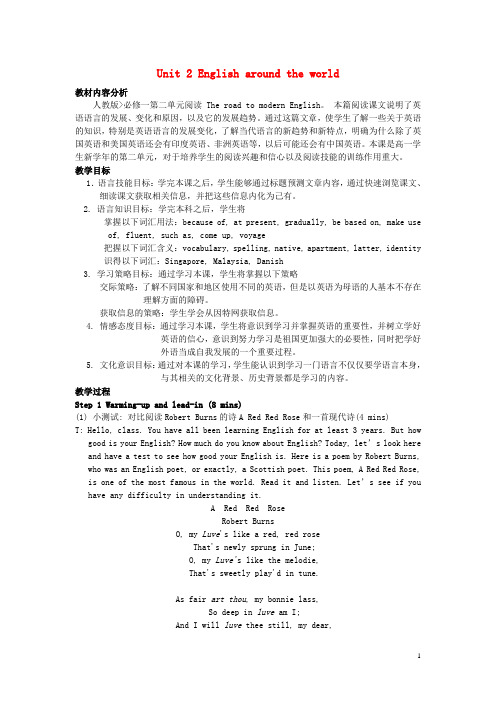
Unit 2 English around the world教材内容分析人教版>必修一第二单元阅读The road to modern English。
本篇阅读课文说明了英语语言的发展、变化和原因,以及它的发展趋势。
通过这篇文章,使学生了解一些关于英语的知识,特别是英语语言的发展变化,了解当代语言的新趋势和新特点,明确为什么除了英国英语和美国英语还会有印度英语、非洲英语等,以后可能还会有中国英语。
本课是高一学生新学年的第二单元,对于培养学生的阅读兴趣和信心以及阅读技能的训练作用重大。
教学目标1.语言技能目标:学完本课之后,学生能够通过标题预测文章内容,通过快速浏览课文、细读课文获取相关信息,并把这些信息内化为己有。
2. 语言知识目标:学完本科之后,学生将掌握以下词汇用法:because of, at present, gradually, be based on, make use of, fluent, such as, come up, voyage把握以下词汇含义:vocabulary, spelling, native, apartment, latter, identity 识得以下词汇:Singapore, Malaysia, Danish3. 学习策略目标:通过学习本课,学生将掌握以下策略交际策略:了解不同国家和地区使用不同的英语,但是以英语为母语的人基本不存在理解方面的障碍。
获取信息的策略:学生学会从因特网获取信息。
4. 情感态度目标:通过学习本课,学生将意识到学习并掌握英语的重要性,并树立学好英语的信心,意识到努力学习是祖国更加强大的必要性,同时把学好外语当成自我发展的一个重要过程。
5. 文化意识目标:通过对本课的学习,学生能认识到学习一门语言不仅仅要学语言本身,与其相关的文化背景、历史背景都是学习的内容。
教学过程Step 1 Warming-up and lead-in (8 mins)(1) 小测试: 对比阅读Robert Burns的诗A Red Red Rose和一首现代诗(4 mins)T: Hello, class. You have all been learning English for at least 3 years. But how good is your English? How much do you know about English? Today, let’s look here and have a test to see how good your English is. Here is a poem by Robert Burns, who was an English poet, or exactly, a Scottish poet. This poem, A Red Red Rose, is one of the most famous in the world. Read it and listen. Let’s see if you have any difficulty in understanding it.A Red Red RoseRobert BurnsO, my Luve's like a red, red roseThat's newly sprung in June;O, my Luve's like the melodie,That's sweetly play'd in tune.As fair art thou, my bonnie lass,So deep in luve am I;And I will luve thee still, my dear,Till a' the seas gang dry.Till a' the seas gang dry, my dear,And the rocks melt wi' the sun;I will luve thee still, my dear,While the sands o' life shall run.And fare thee well, my only Luve!And fare thee well, a while!And I will come again, my Luve,Tho' it were ten thousand mile!T: Did you find it easy or difficult? What about this one? This poem was written by a modern writer.I Am Not YoursI am not yours, not lost in you,Not lost, although I long to beLost as a candle lit at noon,Lost as a snowflake in the sea.You love me, and I find you stillA spirit beautiful and bright,Yet I am I, who long to beLost as a light is lost in light.Oh plunge me deep in love—put outMy senses, leave me deaf and blind,Swept by the tempest of your love,A taper in a rushing wind.T: Why is the first poem difficult to understand while the second one not? (Mainly because of some of the words used in the first poem, which are not often used now. Robert Burns lived in the 18th century while the writer of the second poem is a modern poet.) So we can see people in the past used different words from what is used today.(2) 听一段一位学生和来自澳大利亚的外教的对话(4 mins)T: Now, when one day Qiu Zhensong met our foreign teacher Zak, who is from Australia, what happened? Let’s welcome Zak and Qiu Zhensong.(After the dialogue, the foreign teacher explained.) Did you understand our dialogue? (Ss: No.) What’s the difficulty? (Different words were used in Australia which you do not know in American or British English.) T: So from the two poems and the dialogue we can see people from different countries speak different English and people in different times also use different English. How did the difference come about?[意图说明] 引入话题:不同时代、不同国家所使用的英语有所不同。
(完整版)高中英语人教版必修一课文内容电子版Unit2
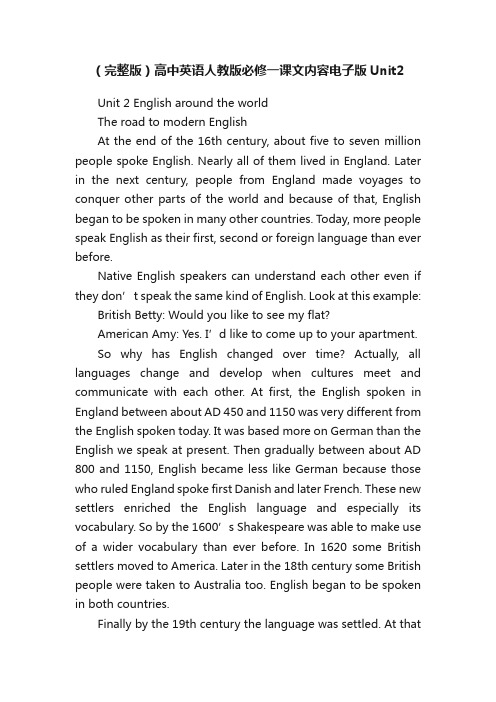
(完整版)高中英语人教版必修一课文内容电子版Unit2Unit 2 English around the worldThe road to modern EnglishAt the end of the 16th century, about five to seven million people spoke English. Nearly all of them lived in England. Later in the next century, people from England made voyages to conquer other parts of the world and because of that, English began to be spoken in many other countries. Today, more people speak English as their first, second or foreign language than ever before.Native English speakers can understand each other even if they don’t speak the same kind of English. Look at this example: British Betty: Would you like to see my flat?American Amy: Yes. I’d like to come up to your apartment.So why has English changed over time? Actually, all languages change and develop when cultures meet and communicate with each other. At first, the English spoken in England between about AD 450 and 1150 was very different from the English spoken today. It was based more on German than the English we speak at present. Then gradually between about AD 800 and 1150, English became less like German because those who ruled England spoke first Danish and later French. These new settlers enriched the English language and especially its vocabulary. So by the 1600’s Shakespeare was able to make use of a wider vocabulary than ever before. In 1620 some British settlers moved to America. Later in the 18th century some British people were taken to Australia too. English began to be spoken in both countries.Finally by the 19th century the language was settled. At thattime two big changes in English spelling happened: first Samuel Johnson wrote his dictionary and later Noah Webster wrote The America Dictionary of the English Language. The latter gave a separate identity to American English spelling.English now is also spoken as a foreign or second language in South Asia. For example, India has a very large number of fluent English speakers because Britain ruled India from 1765 to 1947. During that time English became the language for government and education. English is also spoken in Singapore and Malaysia and countries in Africa such as South Africa. Today the number of people learning English in China is increasing rapidly. In fact, China may have the largest number of English learners. Will Chinese English develop its own identity? Only time will tell.STANDARD ENGLISH AND DIALECTSWhat is standard English? Is it spoken in Britain, the US, Canada, Australia, India and New Zealand? Believe it or not, there is no such thing as standard English. This is because in the early days of radio, those who reported the news were expected to speak excellent English. However, on TV and the radio you will hear differences in the way people speak.When people use words and expressions different from “standard language”, it is called a dialect. American English has many dialects, especially the midwestern, southern, African American and Spanish dialects. Even in some parts of the USA, two people from neighboring towns speak a little differently. American English has so many dialects because people have come from all over the world.Geography also plays a part in making dialects. Some people who live in the mountains of the eastern USA speak with an olderkind of English dialect. When Americans moved from one place to another, they took their dialects with them. So people from the mountains in the southeastern USA speak with almost the same dialect as people in the northwestern USA. The USA is a large country in which many different dialects are spoken. Although many Americans move a lot, they still recognize and understand each other’s dialects.。
人教版必修一Unit2《English around the world》(the 1st period)word教案
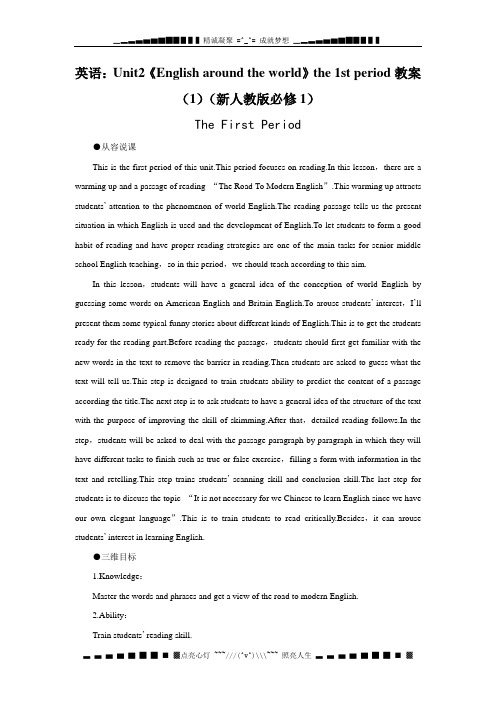
英语:Unit2《English around the world》the 1st period教案(1)(新人教版必修1)The First Period●从容说课This is the first period of this unit.This period focuses on reading.In this lesson,there are a warming up and a passage of reading “The Road To Modern English”.This warming up attracts students’ attention to the phenomenon of world English.The reading passage tells us the present situation in which English is used and the development of English.To let students to form a good habit of reading and have proper reading strategies are one of the main tasks for senior middle school English teaching,so in this period,we should teach according to this aim.In this lesson,students will have a general idea of the conception of world English by guessing some words on American English and Britain English.To arouse students’ interest,I’ll present them some typical funny stories about different kinds of English.This is to get the students ready for the reading part.Before reading the passage,students should first get familiar with the new words in the text to remove the barrier in reading.Then students are asked to guess what the text will tell us.This step is designed to train students ability to predict the content of a passage according the title.The next step is to ask students to have a general idea of the structure of the text with the purpose of improving the skill of skimming.After that,detailed reading follows.In the step,students will be asked to deal with the passage paragraph by paragraph in which they will have different tasks to finish such as true-or-false exercise,filling a form with information in the text and retelling.This step trains students’scanning skill and conclusion skill.The last step for students is to discuss the topic “It is not necessary for we Chinese to learn English since we have our own elegant language”.This is to train students to read critically.Besides,it can arouse students’ interest in learning English.●三维目标1.Knowledge:Master the words and phrases and get a view of the road to modern English.2.Ability:Train students’ reading skill.3.Emotion:Let students know more about English and inspire students to study English hard.●教学重点The understanding and comprehension of the passage.●教学难点(1)How to get to master the useful words and expressions.(2)How to improve students’ ability to read an article.●教具准备cassette recorder,some pieces of slide●教学过程Step 1 GreetingsT:Good morning,boys and girls!S:Good morning,teacher!Step 2 Warming upT:English is a widely used language.Do you know in which countries English is spoken as their native language?S a:The US,the UK,Australia,Canada...T:(a slide:Nancy:Oh,there you are.Now then,did you have a good flight?Joe:Sure,we flew all the way direct from Seattle to London.Nancy:You must be very tired.Did you sleep at all on the plane?Joe:No,not really.I’m very tired.Could I use your bathroom?Nancy:Why,of course.You don’t need to ask,just make yourself at home.Let me give you a clean towel.Joe:A towel?Nancy:Yes.Here you are.The bathroom is upstairs.It’s the second door on the left.(After a while)Nancy:Have you found it?Joe:Well,eh,yes,I mean no.I mean,I found the bathroom,but I didn’t find what I was looking for!)Here is a short dialogue.Read it and discuss with your partner:What is it that Joe can’t find inthe bathroom?Why can’t he find it?S b:It is the toilet.T:And why?S c:Perhaps when Joe says “bathroom”,he means a place,where there is a toilet.But in Nancy’s eyes,it is a place where people can only have a bath.T:You are right.Do you know why there’s a misunderstanding between them?S d:Because they speak different kinds of English.T:Great.There’s more than one kind of English in the world.In some important ways they’re different.They’re called world English.Can you guess what they include?S e:Canadian,British,American,Australian and Indian English.T:Right.So you know even two native speakers of English may still not speak the same kind of English.Look at the examples on P9.Now try to guess which of the following words are British English and which are American English.Suggested answers:Am.English:mom;on a team;rubber;gasBr.English:mum;in a team;eraser;petrolStep 3 New WordsT:From today on,we’ll learn something about English around the world.First of all,let’s get familiar with the new words.Yesterday I asked you to read the new words and look up the meaning of them.Now let’s have a game in which one of you tells us the meaning or the explanation of the words and the others guess which word it is.Let’s go!Suggested explanation:1.include:have something or somebody as one of a group.e.g.:The tour included a visit to the Science Museum.2.play a role in:have a part in3.international:connected with two or more countries4.native:(1)connected with the place where you have always lived or have lived for a long time(2)a person who lives in a particular place,especially sb. who has lived there a long time5.elevator:lift6.flat:(1)having a smooth surface (2)(Br. E)a set of rooms for living in7.apartment:(Am. E)a set of rooms for living in8.modern:of the present time or recent timee up:to move toward10.culture:the customs and beliefs,art,way of life and social organization of a particular country or group11.actually:really;in fact12.present:(1)existing or happening now (2)being in a particular place13.rule:control14.vocabulary:all the phrases and phrases you learnage:the way in which words are used in a language16.identity:who or what sb./sth. isernment:the group of people who are responsible for controlling a country or a state18.rapidly:fastT:That’s great!You’ve made a good preparation.Now please read the words together.(show words and explanations on the slide)Step 4 Pre-readingT:Just now,we’ve known that there’re many kinds of English in the world.Then why are there so many kinds?Ss:We don’t know.T:Anyway,we’ll find out the cause today.Now read the title of the passage “the road to modern English”.What do you think it will tell us?S f:I guess it will tell us the development of English.Step 5 SkimmingT:Now let’s find out whether your answer is right.So please read the passage fast in silence and find out the main idea of each paragraph.Suggested answer:Para.1:Brief introduction of the change in English.Para.2:An example of different kinds of English.Para.3:The development of English.Para.4:English spoken in some other countries.Step 6 ScanningT:You’ve mastered the structure of the passage.Now please read para.1 and 2 loud in detail.T:(several minutes later)Have you finished?Here’re some statements of which some are right while some not.Read them and then tell whether they are true or false.If false,please find out the mistake and correct it.(slides:1.Most of the English speakers in the 16th century lived in England.2.More and more people use English as their first or 2nd language.3.The US has the largest number of English speakers.4.Native English speakers can understand everything because they speak the same kind of English.)S g:The first one is true.S h:The second one is true.S i:The third one is false.China has the largest number of English speakers.S j:The fourth one is false.Native English speakers may not be able to understand everything because they do not speak the same kind of English.T:You did a very good job.Now please read para.3 after the tape.And then fill in the form on the screen.T:We know culture communication brings about changes in English.Can you think of any effect that Chinese has on English?S k:In English there are some Chinese words such as gongfu,long time no see,...T:Great!With more closely communication of culture,English is changing more frequently.T:As we all know,English is spoken as the native language mostly in western countries.Then what about English in some other parts of the world?After reading the last paragraph,would you please say something about the present situation of English in your own words?S l:It is also spoken as a foreign or 2nd language in many other countries.For example,in India,it is used for government and education.In some African and Asian countries,it is also spoken,such as in South Africa,Singapore and Malaysia.While in China,the number of English speakers is increasing fast.T:Quite good.Step 7 DiscussionT:So far,we’ve known that English is becoming more and more important in China.It has been an important subject for Chinese students.But someone say that Chinese is a much more elegant language.So it is more important for us to master it and it is not so necessary for us to master a foreign language.Do you agree with this opinion and why?Suggested answer:I don’t agree with it.With the cultural communication becoming more and more frequent,the chance to contact foreigners,exported goods,international conferences,and so on,is more and more.As the most widely used language,English is regarded as the language used in most international situations.Thus,if we want to keep up with the times,we’d better master English and use it as a tool.Step 8 Summary and homeworkT:Today we’ve learned an article on “the road to modern English”.After class,you should read it again and again to get the idea of the text further.Do the exercises of comprehending and try to tell your partner something about English in our own words.That’s all for today.Class is over.●板书设计Unit 2 English around the worldThe First PeriodNew words:Main idea of each para-graph:... ...... ...●活动与探究This activity is to make research into differences between different kinds of world English and some words from other languages in English.Divide students into two groups to do research and fill the following table in their free time.Differences Pronunciation Spelling MeaningUsage...Words from other languages Chinese Japanese French Spanish German...●备课资料Soon There Will Be No Such Thing As “Wrong”English In this article:Senior Indian journalist Gautaman Bhaskaran says that English is so flexible that one day there will be too many variations around the world.English is a victim of its own success.The other day The Times in London displayed a cartoon showing an excited schoolboy flaunting his test scores:“I done good in English.”Days later,editors of the Oxford Dictionary of English rued the spread of what they termed “greengrocer’s English”.Grammar and syntax,they regretted,were going out of fashion.Others in England—in the Oxford University Press,the BBC and so on—said the incorrect use of cliches were marring the smooth flow of a great language whose ability to imbibe and absorb has been one important reason for its success.This success also stems from the language’s unique position of being the only one spoken in most parts of the world.Really,English has no boundaries.Even in countries such as Japan and China,which were not colonized by Britain,English is making a determined “conquest”.Unfortunately,such a conquest is not always welcome because a language sometimes doubles as a political weapon.At some point it ceases to be just a means of communication and English is a classic example of this.It has always led a troubled life.It has been disliked,even hated,largely because the people who originally spoke English conquered,colonized and terrorized half the world,or just about.The animosity to the language continues,at least in some places.The bitterness that the French,for instance,have for English is a good example of a language being giving a quasi-political role in society.Fortunately,this aversion does not run as it did some years ago,and there is a growing realization that English is the lingua franca.China and Japan,among a host of other nations,have been making serious efforts to promote the language.Some months ago there was a hue and cry in Singapore over the spread of “terrible English”which the authorities called “Singlish”.“Down with it!”they said,and urged Singaporeans to learn correct English,the phenomenal flexibility of which has often made things difficult for those who have to use it every day.Today even university graduates find it hard to pen a couple of correct sentences in it.More horrifying is that many teachers and university vice-chancellors speak and write poor and ungrammatical English.Often,they are found to be out of touch with what is called “usage”and,as we all know,this is one of the pillars the language rests on.Yet,despite the mess that English is in India,the nation has—more than two centuries after Samuel Johnson wrote his English dictionary—become the hottest destination for top lexicographers.The new 10th revised edition of the Oxford Concise English Dictionary includes hundreds of Indian words.Leading the list of 600 Indian English entries are “Hindutva”(Hindu identity),“dada”(older brother),“panchayat”(local administration),“chai”(tea),“pani”(water),“puri”(a dish made of wheat)and “dosa”(rice pancake).In fact,Indian words from 20 per cent of entries and rank as the third-largest component after American and AustralianEnglish segments.Other former British colonies such as New Zealand,South Africa and the Caribbean islands follow the Indian English collection of words.English,despite its hiccups,is endearing to the common Indian man or woman.About 150 years after Lord Macaulay introduced the language in India to create “babus”(clerks)for the British bureaucracy,70 million Indians speak English,a number that is higher than that in Britain.However,there is a sneaking fear among Puritans that with this kind of spread,English may stop being English.While the French have fanatically preserved the purity of their language,the English have liberally allowed other influences to affect their lingo.So,what is seen as its strength —the fact that people all over the world understand it—can be an undermining obstacle.There might be a serious problem if every state or continent were to have its own version of English.As one writer said:“There is a risk in relentless atomization.”With too many variations of the language,a time may come when one group of English-speaking people may not be able to understand another.This is happening.Hear the way Singaporeans speak English.Listen to the Australians pronouncing “e”;it sounds like “a”.A few of the films made lately by British directors Ken Loach and Mike Leigh had to have subtitles in English.Accents in the north of Britain can be hard for people in the south to understand,let alone those outside the island.The point is,no language must be allowed such flexibility—anything goes in the name of functional communication—that people begin to take liberties with it.Ultimately,there may be no such thing as wrong English.The schoolboy in the Times cartoon was doing just that.He knew nobody would scold him for getting his English wrong.不久以后就没有“错误的”英语这一说了英语成了自身成功的牺牲品,前几天,伦敦的《泰晤士报》刊登了一幅漫画,上面画了一个兴高采烈的男学生炫耀他的考试成绩:“I done good in English”(我的英语成绩不错)。
新人教必修一-Unit2-English-around-the-world[同步练习]
![新人教必修一-Unit2-English-around-the-world[同步练习]](https://img.taocdn.com/s3/m/686b8cf3aff8941ea76e58fafab069dc50224726.png)
Unit 2 English around the world一、单词拼写1. I had lost my _________ (身份)card and was being questioned by the police.2. Do you want to take the __________(电梯)or use the stairs?3. ____________(实际上),The cost of repairs was a lot less than we had expected.4. Total profit was $ 690 million in the ___________(后者的)half of 2000.5. The ship sank on its long ____________(航行)home.6. Air is a mixture of g _____________.7. Their arguments were becoming more and more f________.8. She’s f _________ in four languanges.9. His English v __________ is getting bigger all the time.10. Spanish is the country’s o __________ language.11. If you c ________ someone to do something, you order them to do it.12. He walked five b __________ down High Street.13. When she saw me, she r _________ me at once.14. The book refers to modern English _________(惯用法).15. Thank you for all your e __________ of praise.16. The ten most ___________(频繁地)asked questions are listed below.17.Jet Li has played lots of leading r_______ in Kong Fu films.18. What is _______ (标准) English?19.The Indian _______ (本地人) aren’t getting on well with the Whites in this area.20.Judging from his _______ (口音), he must be from North East of China.21.Your ______________ (词汇量) decides your success.22..To speak English ________ (流利地),you’d better make use of every chance to practise.23.His interest in maths ______________ (逐渐地) increases.二、短语回顾1. 因为;由于__________________2. 走近;上来__________________3. 目前;现在__________________4. 以…为基础__________________5. 使用;利用__________________6. 例如_______________________7. 扮演一个角色;参与___________________ 8. 即使__________________9. 信不信由你__________________ 10. 大量的;许多______________11. …的数量;…的数目_______________ 12. 想出;提出________________三、根据中文意思补全句子1. 在学校的管理中,校长起着重要的作用。
高中英语 UNIT 2 English Around the World教案 新人教版必修1
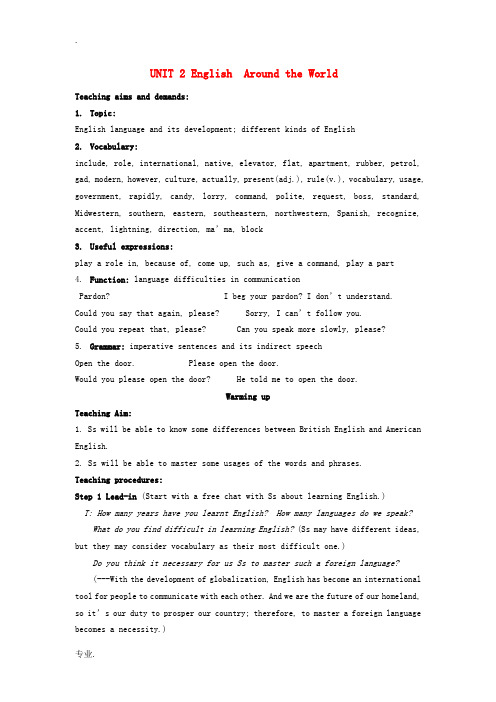
UNIT 2 English Around the WorldTeaching aims and demands:1.Topic:English language and its development; different kinds of English2.Vocabulary:include, role, international, native, elevator, flat, apartment, rubber, petrol, gad, modern, however, culture, actually, present(adj.), rule(v.), vocabulary, usage, government, rapidly, candy, lorry, command, polite, request, boss, standard, Midwestern, southern, eastern, southeastern, northwestern, Spanish, recognize, accent, lightning, direction, ma’ma, blockeful expressions:play a role in, because of, come up, such as, give a command, play a part4.Function: language difficulties in communicationPardon? I beg your pardon? I don’t understand.Could you say that again, please? S orry, I can’t follow you.Could you repeat that, please? Can you speak more slowly, please?5.Grammar: imperative sentences and its indirect speechOpen the door. Please open the door.Would you please open the door? He told me to open the door.Warming upTeaching Aim:1. Ss will be able to know some differences between British English and American English.2. Ss will be able to master some usages of the words and phrases.Teaching procedures:Step 1 Lead-in (Start with a free chat with Ss about learning English.)T: How many years have you learnt English? How many languages do we speak?What do you find difficult in learning English? (Ss may have different ideas, but they may consider vocabulary as their most difficult one.)Do you think it necessary for us Ss to master such a foreign language?(---With the development of globalization, English has become an international tool for people to communicate with each other. And we are the future of our homeland, so it’s our duty to prosper our country; therefore, to master a foreign language becomes a necessity.)In which countries is English used as the native language? Do you think the Englishes spoken all around the world are all the same ?Enjoy BBC and VOAStep 2 discussionActivity 1. Ss discuss in groups about the differences between British English and American English, and give some examples.Activity 2. Ss guess which of the following words is British English and which is American English:apartment/flat bathroom/toilet can/tin candy/sweetcheck/banknote (cheque) elevator/lift fall/autumn game/match line/queue penal /pen friend mad/angry mail/ postmom/mum movie(film)/film pants /trousers repair/mendsick/ill cookie/biscuit crazy/mad drugstore/chemist’s gas/petrolStep 3 warming upT: Now let’s enjoy a dialogue between two foreigners.T: Which language do they speak? Why do they misunderstand each other?(There exist differences between Englishes. The different Englishes make up the world Englishes.)Step 4 discussion1.Do we need to learn both British and American English?2.What kind of English would you like to learn?3.Why?Step 5 appreciationAppreciate the dialogue between Bush and BlairStep6 Homework1. Preview reading2. English weekly3. p11 ex1,2.ReadingTeaching aim:a) Ss will be able to know the development of English and feel the role that culture plays in the change of language. b) Comprehend the whole passagec) Ss will be able to know how to get the key sentence of a paragraph.Teaching procedures:Step 1 lead inAsk students several questions in the form of brain storming.1.Do you know the countries where people speak English? List them on a pieceof paper.2.What are the two main groups of English?3.Do you know the differences between British English and American English?4.Do you know the history of English?Step 2 fast readingEnglish is not only different from country to country, but also different from what it was before. Read the title “the road to modern English〞 and predict (预测) what the passage is mainly about?T: Scan the text to find or make out a key sentence for each paragraph.Let the students find out key sentence of each paragraph or ask them to summarizeStep 3. Intensive readingT: Let’s enjoy the whole passage paragraph by paragraph again. Pay special attention to the following Qs:How did old English develop into modern English?Why does English change all the way?What other Englishes developed from the old English?(1). Give the three major periods of the development of English.the end of the 16th century-------- the next century ------------ todayWho promoted the spread of English?People. When they moved, they carried English to different places.(2) T: Although they speak English, yet sometimes they can not understand each other well, why?--------- Because there exist differences between different Englishes, not only in vocabulary, but also in pronunciation and spelling. (hot/mum/honour/ honor/neighbour/neighor…..)(3) T: How do these differences come about? (Why does English change over time?)--------- Because of cultural communication.Ask ss to find out the characteristics of each time according to the time axis.AD450-1150: German 1150-1500: less like German; more like FrenchIn the 1600’s: Shakespeare’s English The time ADEL was written: American EnglishLater: Australian English(4) T: Besides the countries where English is used as a native language, where else is English used as a foreign language?---------- South Asia, India, South Africa, Singapore, Malaysia and China.Activity 1. fill in the chartActivity 2. Answer the following questions(1)What is the clue of the passage?(2) Why does India have a very number of English speakers?(3) When did people from England begin to move to other parts of the world?Activity 3: Choose the correct answers.Step 4 Post-ReadingT: From the passage we can see English is widely accepted as a native, second or third language. No wonder the number of people learning English in China is increasing rapidly. Will Chinese English become one of the world Englishes? ---------- “ Only time will tell〞.T: How do you understand this sentence?---------- It means that something can only be known in the future.T: What can you infer from this sentence about the development of English in China? --------- It indicates that it remains to be seen just how much the Chinese culture will influence the English language in the present country.Step 5. Language focus:1)even if=even though: in spite of the fact; no matter whether: He likes tohelp us even if he is very busy.2)communicate with: exchange information or conversation with other people:He learnt to use body language to communicate with deaf customers.3)actually=in fact: used when you are adding new information to what you havejust said: We’ve known for years. Actually, since we were babies.4)be based on…:5)make use of: use sth. available6)Only time will tell: to say that something can only be known in the future:Will China’s nati onal football team enter for the next finals of the World Cup? Only time will tell.Step 6 DiscussionWork in groups. Discuss the question and then ask two groups to report their answers to the class.Step 7 Homework1. Read the passage as fluently as you can.2. Find out some words and sentences you think are beautiful and recite them.3. p11.ex2.3.4Vocabulary and Useful ExpressionsWarming up1.They are called world Englishes and they include Canadian, British, American,Australian and Indian.include: v. 包括,包含e.g. The price includes service. 这个价钱包括服务费。
人教新课标高中英语必修一Unit 2 English around the world课件

BritishEnglish
10
BritishEnglish
AmericanEnglish
spelling
pronunciation
colour, favourite, theatre, centre, travelled, metre
color, favorite, theater, center, traveled, meter
2.Prepareforthenextclass. 3.FinishtheexercisesonWB.
19
20
Period3Learningaboutl anguage
Unit2Englisharoun dtheworld
21
Period3:幻灯片27-48页
Revision(3m)
Match:(Reivewthenewwords)
dtous. Themonitortoldusnottoplaygamesintheclassroom. “Willyoupleasenotsmokehere?”sheadded. Sheaskedmenottosmokehere.
29
Learningusefulstructure–IV(10m)
apartment
autumn
fall
underground(地铁) subway university(大学) college
rubbish(垃圾) garbage
dustbin(垃圾箱) trashcan
holiday
vacation
fortnight(两星期)twoweeks
12
Reading–I(3m)
Paragraph2:tellsusnativespeakerscanund erstandeachotherbutnoteverything.
人教版新课标英语必修一Unit2EnglisharoundtheworldReading课件

Unit 2 Reading -2 English Around the World
Recollect the passage you've learned.
Recollect the passage you've learned.
Read the passage aloud please. Recall the scene in the passage when reading.
even if they don't speak _th_e__s_am__e_k_i_n_d_o_f__ English.
6. “Would you _li_k_e_t_o_s_e_e_m__y_f_l_a_t _?” “ Yes. I'd like to come up _t_o_y_o_u_r__ap_a_r_t_m_e_n_t___.”
8. At first the English spoken in England between __a_b_o_u_t_A_D__4_5_0__an_d__1_1_5_0___ was very different from the English __s_p_o_k_e_n_t_o_d_a_y_.
Comprehension -- Exercise 1. 4. The language of the government is always the
F language of the country.
(because the government has to use the language of the country that rules it) 5. English is one of the official languages used in
高中英语人教版必修1《Unit 2 English around the world Section

1. Can you find the following command and
request from Reading?
command n.& vt.命令;指令;掌控 command that sb. (should) do sth.命令某人做某事 command sb. to do sth.命令某人做某事
2. 当直接引语为表示建议、提议、要求、劝告的 祈使句(或表示要求、提议、劝告、建议的疑问句) 时 , 多 用 suggest+doing/that 从 句 ( 如 suggest 后 接 that从句时, 从句使用虚拟语气should+动词原形, should也可省略), 及ask/advise/want/beg sb. +to do等结构。
*The leader said to the workers, “Don’t speak while working. ” →The leader warned the workers not to speak while working.
【名师点津】 (1)不论是否定祈使句, 还是表示委婉语气的否定疑问 句, 在变为间接引语时, 要用不定式的否定情势: not/never to do sth. 。 (2)直接引语中的称呼语变为间接引语时, 一样把它当 作主句谓语动词的宾语用。 *She said, “Don’t make so much noise, children! ” →Shetold the children not make so much noise.
③We recognize him to be a hardworking and
honest person.
_公__认__
新人教版必修一 Unit 2 English around the world全单元[教案]
![新人教版必修一 Unit 2 English around the world全单元[教案]](https://img.taocdn.com/s3/m/fef82b3d580216fc700afd84.png)
Teaching planTeaching aims:1. Get the students to learn different reading skills.2. Get the students to learn about the English language.Teaching important points:1. Develop the students reading ability and let them learn to use some reading strategies such as skimming, scanning, and so on.2.Enable the students to learn about English language and know different kinds of English so as to communicate with people from different countries.Teaching difficult points:Develop the students’ readi ng ability.Teaching methods :Task-based teaching and learningUnit 2English around the world知识目标:本单元需要学习的重点单词为:include role international native elevator flat apartment rubber petrol gas modern culture AD actually present(adj. )rule(v. ) vocabulary usage identity government Singapore Malaysia rapidly phrase candy lorry command request retell polite boss standard Midwestern southern Spanish eastern southeastern northwestern recognize accent lightning direction ma’am subway block本单元需要学习的重点词组为:play a role in because of come up such as play a part(in) 本单元需要学习的重点句型为:1. World English comes from those countries, where English plays an important role as a first or second language, either because of foreign rule or because of its special role as an international language. (the Attributive Clause; either. . . or. . . )2. Native English speakers can understand each other even if they don’t speak the same kind of English. (even if. . . )3. It became less like German, and more like French because those who ruled England at that time spoke French. (those who. . . )4. Today the number of people learning English in China is increasing rapidly. (the number of+ n. 作主语时,谓语动词用单数形式)5. Believe it or not, there is no such a thing as standard English. (Believe it or not, . . . )6. The US is a large country in which many different dialects are spoken. (the Attributive Clause)7. In fact, an English dictionary like the kind you use today wasn’t made until the time of the Qing Dynasty. (the Attributive Clause; not. . . until. . . )8. These men spent nearly all of their lives trying to collect words for their dictionaries. (spend. . . in doing sth. )9. At the age of fourteen, he left his village school in Scotland and taught himself while working ina bank. (while doing. . . )10. We know that languages develop and change over time and that is why we have new dictionaries from time to time. (that is why. . . )本单元需要掌握的交际功能用语为:语言交际困难(Difficulties in language communication) Pardon?I beg your pardon?I don’t understand.Could you say that again please?Sorry, I can’t follow you.Could you repeat that, please?Could you speak more slowly, please?How do you spell it, please?本单元需要掌握的语法为:祈使句及其间接引语(the imperative sentence and its indirect speech)1. 要求或命令(demands or orders)“Open the door, ” told he.→He told/ordered me to open the door.2. 请求(requests)He said, “Please open the door. /Would you please open the door? ”→He asked me to open the door.能力目标:1. 能运用所学语言知识谈论有关“世界英语”方面的话题。
新人教必修一_Unit2_English_Around_the_World全单元教案
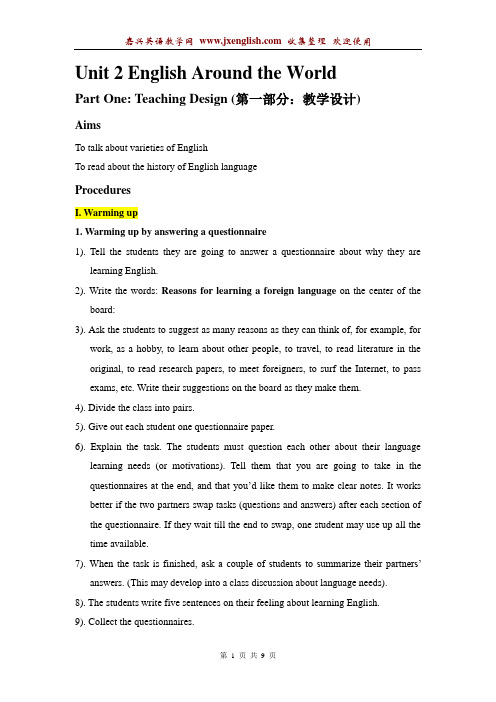
Unit 2 English Around the WorldPart One: Teaching Design (第一部分:教学设计)AimsTo talk about varieties of EnglishTo read about the history of English languageProceduresI. Warming up1. Warming up by answering a questionnaire1). Tell the students they are going to answer a questionnaire about why they arelearning English.2). Write the words: Reasons for learning a foreign language on the center of theboard:3). Ask the students to suggest as many reasons as they can think of, for example, forwork, as a hobby, to learn about other people, to travel, to read literature in the original, to read research papers, to meet foreigners, to surf the Internet, to pass exams, etc. Write their suggestions on the board as they make them.4). Divide the class into pairs.5). Give out each student one questionnaire paper.6). Explain the task. The students must question each other about their languagelearning needs (or motivations). Tell them that you are going to take in the questionnaires at the end, and that you’d like them to make clear notes. It works better if the two partners swap tasks (questions and answers) after each section of the questionnaire. If they wait till the end to swap, one student may use up all the time available.7). When the task is finished, ask a couple of students to summarize their partners’answers. (This may develop into a class discussion about language needs).8). The students write five sentences on their feeling about learning English.9). Collect the questionnaires.ReadingTo get the students thinking about the topic of the reading passage.1). Have a student list on the board all the English-speaking countries in the worldthat they can think of.2). Give the students hints about the places they haven’t mentioned.3). Provide the students with an opportunity to think about the reasons for the spreadof English around the world.★English is one of the official languages of the Olympic Games and the United Nations.★English dominates international websites and provides nearly all of the new computer terminology.★Tourism and trade from Western Europe and North America has contributed to the spread of English.★Satellite TV, radio programs like Joy FM, CDs and, of course, Hollywood films all broadcast English into China. Also, a number of Chinese films include English subtitles.1. SkimmingRead quickly to get the main idea of the text.Let the students find out key sentence of each paragraph or ask them to summarize the main point for each paragraph in their own words.2. ScanningRead to locate particular information and complete the comprehending Exercise One.3. Following upWork in groups. Discuss the two questions and then ask two groups to report their answers to the class.1). Do you think it matters what kind of English you learn? Why?1)Why do you think people all over the world want to learn English?4. Language focus:1)even if=even though: in spite of the fact; no matter whether: He likes to helpus even if he is very busy.2)communicate with: exchange information or conversation with other people:He learnt to use body language to communicate with deaf customers.3)actually=in fact: used when you are adding new information to what you havejust s aid: We’ve known for years. Actually, since we were babies.4)be based on…:5)make use of: use sth. available6)Only time will tell: to say that something can only be known in the future:Will China’s national football team enter for the next finals of the Worl d Cup?Only time will tell.Period 3: A sample lesson plan for Learning about Language AimsTo discover useful words and expressionsTo discover useful structuresProceduresI. Direct and Indirect SpeechII. Discovering useful words and expressions1.Work in pairs. Do exercises 1, 2, 3 and 4. Then check the answer you’re yourclassmates. The teacher helps the students discover the difference in prepositions.2.Play the tape for the students to listen and ask them to mark the sentence stressand intonation. Then practice reading in pairs.(The teacher brings the students’ attention to the British and American words that are different but have the same meaning.)III. Discovering useful structures(Making commands and requests using indirect speech)1. In groups of four, think of at least three commands your teachers and parents usually give.You may follow these steps.1)Choose one who is to give the first command.2)Ask another person in your group to tell somebody what you said.3)The third person will change the request or command from direct into indirectspeech.4)Change role so that each person gets the chance to give commands and turn theminto indirect speech.2. Get the students thinking about the difference between the request and command.Then read the replies and decide whether they are in answer to a request or a command. Write the sentence down.★A: _______________________________________B: I’ll go and collect some wood right now, master.★ A: _______________________________________B: O f course I’ll be happy to collect your shopping for you.★A:__________________________________________B: Yes. I’ll shut the door at once, Mr. Zhang.★A:_________________________________________B: No, I won’t get your coat if you talk to me like that.★A:_________________________________________B: Sorr y. I’ll get that book for you right now.Period 4: A sample lesson plan for Using Language (STANDARD ENGLISH AND DIALECTS)AimsTo read out and talk about STANDARD ENGLISH AND DIALECTSTo write about learning English by brainstormingIV. Speaking1. Make sure the students know that the word used for directions often vary depending on what kind of English the speaker uses. Present the list to the students:2. Prepare their role-play in pairs: Be sure that one plays a speaker of British English and the other a speaker of American English. Ask students to select actual streets and location in their hometown for giving directions.3.Performance: Ask two pairs to perform their dialogue in class.V. Writing1. Making a posterFirst ask the students to make educated guesses about how English can help some aspect of Chinese life, in particular its economy.Then, in pairs students work on their poster.Finally, ask several pairs to present their poster in class for assessment.2.Writing Assessment1)Can you give persuasive reasons for the topic on your poster?2)Can you verbalize your ideas fluently?3)Can you put your own English learning experiences into a broader perspective?4)Can you organize your ideas in a logical way?5)Have you made a brainstorming map before you set out to design your poster? Doyou think it helps your writing?6)What kind of mistakes have you made in your writing? What can you do to avoidsuch mistakes?Further ApplyingThe teacher may also guide the students to do the writhing task in the Workbook on page 53. You may take the following steps:Step 1: Students divided into groups of four share their own learning experiences and ideas about English learning.Step 2: Students make a list as follows:Step 3: Make notes about the paragraphs for the writing.Step 4: The teacher helps develop ideas in a positive and encouraging way. Step 5: Students write about the topic after class as homework.。
人教新课标必修一unit2 English around the world 全单元PPT课件

The government has to use the language of the country that rules it.
4.The language of the government is always the language of the country.
5.English is one of the official language used in India.
18
The road to modern English
19
Predict(预测):
Read the title “The road to modern English” and predict (预测) what the passage is mainly about?
It is mainly about the __h_i_s_t_o_r_y_ and
colour centre traveller
AmE fall tornado I guess
color center traveler
Pronunciation dance [da:ns] dance[dæ
Match the words that have the
22
Read the text again, do the Ex. 1 in Page 10 If it’s false, correct it.
23
After the 17th century, more people began to Speak English.
1.English had the most speakers 2. in the 17th century.
Do you have any plan this fall?
高中英语人教版必修一Unit2EnglisharoundtheworldWorkbook课件(4)
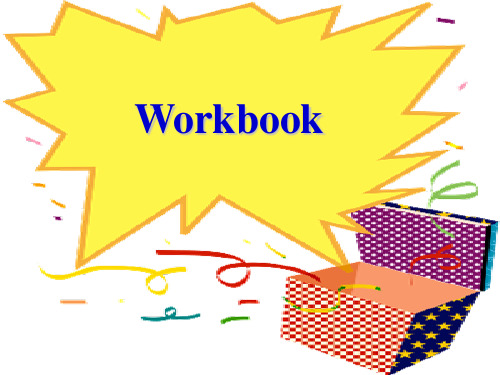
Well, I live on a huge green island in western Europe. Hundreds of years ago, my people spoke a very different language from English. Then the British rulers came. Now the old language is spoken in only a few villages in the western part of my country.
5. fluently July gradually frequently actually
6. unhappy unfriendly untidy unless unnecessary
7. afraid alone awake aloud alive
8. natural capital national official traditional
put his feet in a box to keep warm task 4.no electric light; he worked at night
with candles
Qualities needed:
1Xmitment 2.perseverance 3.accuracy
Who worked on it
2. 邓小平在中国经济的发展过程种起着非常重 要的作用。(play a part; economy)
Deng Xiaoping played an important part in developing the economy in China.
3. 记者问作家他作品种的人物是以谁为原 型的。(base)
高中英语高一人教版必修一unit2Englisharoundtheworld教案、教学设计

Unit 2 English around the world学科:English 授课班级:Senior One 执教教师:授课时间:I.教学内容分析本单元通过对“世界英语”这一话题的探讨,以加强学生对英语语言的了解,对当代语言特别是英语发展趋势的了解。
世界在变化、时代在发展、社会在前进,作为人类交流的工具,语言必然随着时代的发展而变化,特别是英语,这一被公认的通用语言的变化更是让人始料不及。
由于英语在世界上的重要地位和它的广泛使用,各国人民在使用英语的过程中不断发展、改进、更新他们使用的英语和本国语。
这种不断的吸收、交融、容纳、创新就形成了各种各样带有某个国家、某个民族、或某个地区特色的英语。
II.教学重点和难点(一)了解英语在世界上的发展状况,以及各种各样带有民族、地域特色的英语。
(二)了解英语和美语的一些基本的差异,像单词的拼写,单词的发音,句式结构等。
尤其是一些常用词。
(三)掌握本单元教学目的和要求中的词汇的用法。
(四)学会英语中有关交际困难的表达法,,如Pardon? I beg your pardon?熟练掌握祈使句及其间接引语的表达法。
III.教学计划第一课时:Warming Up第二课时:Pre-reading, Reading,第三课时:Comprehending, Learning about Language第四课时:Using Language第五课时:Reading and speaking第六课时:WorkbookIV.教学步骤:Period 1 Warming UpTeaching Goals:1.Get Ss to realize that there are some differences between American Englishand British English.2.Get Ss to practise their oral English.Teaching Procedures:Step 1. Leading-inDo you like to see the film? Do you know the other name of film? Yes. It’s movie. Do you know the difference betweens the two words? One is British English and the other is American English. Do you know the differences between them? The differences between the British and American English are spelling, pronunciation, usage and the most important is culture.Step 2. Warming UpPurpose: To make students understand the differences between American and British English1. Pair work:(1) Get Ss to discuss other words that they have learned.(2) Give Ss some words and expressions and have a discussion①Words:英美电影films movies 旁注汽油petrol gas, gasoline图钉drawing thumb tack钞票banknote bill跳远long jump broad jump糖果sweets candy(1)Divide Ss into groups and ask them to make a dialogue.(2)Let Ss practice the dialogue with their partners.Periods 2 Pre-reading and ReadingTeaching Goals:1.Get Ss to learn about English spoken around the world2.Improve Ss’ reading ability, especially the skills of summarizing, word guessing andscanning.3.Get Ss to realize the importance of learning English and of love of our own country.4.Encourage Ss to think and talk in English through communicative tasks and provideSs with chances of cooperation.Teaching Procedures:Step 1. Leading-inPresent Ss with the names of seven countries (the UK, the USA, Canada, Australia, South Africa, Ireland and New Zealand), and ask S s: “Is there any relationship be tween these 7 countries?” Allow Ss to show their own opinions. The answer is that English is the mother tongue to the people in these 7 countries.1.Present Ss with the names of some other countries: India, Pakistan, Nigeria and thePhilippines. Then ask: “Is English spoken in these countries?” Allow Ss to show their own opinions. English is used as an official language in these countries, which is spoken on formal occasions like governing, schooling and news reporting.2.Also in many countries, English is learned as a foreign language, like in China, Japan,France and so on. So although English doesn’t have the most speakers in the world, it is the most popular language all over the world. Today we’re going to read a lesson entitled English around the world.Step 2. Reading1.Skimming:Get Ss to read through the passage and find the topic sentence of each paragraph.Para 1 Today, more people speak English as their first, second or foreign language than ever before.Para 2 Native English speakers can understand each other even if they don’t speak the same kind of English.Para 3 All languages change when cultures communicate with one another.Para 4 English is also spoken as a foreign or second language in South Asia.2. ScanningPurpose: To get Ss to have some details in the text.Read the text quickly and try to get some details from the text. Work in pairs and try to ask and answer questions from the text. Questions can be like these.Q1. How many people spoke English at the end of the 16th century? Where did they live?Q2. Why is English to be spoken in many other countries in the next century?Q3. Which country has the largest number of English speakers?Q4. Why has English changed over time?Q5. Why does India have a very large number of English speakers?Suggested answers:A1. At the end of the 16th century, about five to seven million people spoke English.A2. In the next century, people from England started moving to other parts of the world,so English began to be spoken in many other countries.A3. China may have the largest number of English speakers.A4.Because all languages change when cultures communicate with one another.A5.India has a very large number of English speakers. This is because Britain ruled India from 1765 to 1947.3.Careful reading:Get Ss to read the passage carefully again and meanwhile try to guess the meaning of the following words or phrases: even if, come up, actually, play a role, vocabulary, usage, identity , government.even if=even though: in spite of the fact; no matter whetherplay a role: to be involved in an activityactually: really; in factvocabulary: all the words and phrases you learnsuch as: for exampleelevator: a machine used for moving people or things up and down4.After reading:Allow Ss to discuss with their partners the meaning of the new words. Then let some Ss explain the words. The teacher can give some further explanations if necessary.5.Answer these questions.(1) Do you think what kind of English you learn matters? Why?(2) Why do you think people all over the world want to learn English?(3) Give Ss chances to ask each other questions on the passage.6. Read the passage and choose the correct answer⑴English has /had the most speakers _______.A. now B, when the British ruled many parts of the worldC. in the time of ShakespeareD. in the 12th century .⑵Which of the following sentence is true?A Language always stay the same B. Language change only after warsC .Language no longer changeD .Language change when cultures change⑶From AD450 to 1150,English sounded more like ______.A . French B. ChineseC. GermanD. Russian⑷Shakepeare’s English was spoken around_______.A. 1400’sB. 1150’sC .450’s D. 1600’s⑸Which country has the fastest growing number of English speakers in the world ?A. Australia B ChinaC. IndiaD. BritainSuggested Answers: (1) A (2) D (3) C (4) D (5) BStep 3. Discussion1.After reading the passage, we’ve learned so much about English spoken around theworld. Do you think it’s necessary to have a good knowledge of English? Why do you think so? Please form groups of four and discuss these questions with your partners.(The teacher should walk around to provide any necessary help.)2.Give the students chances to express their opinions freely.3.Summary by the teacher:Through learning this passage, we have got to know that English is becoming more and more popular all over the world now. So English learning seems important to everyone, especially us students of the new century. With China’s entry into WTO, English will play a more important part in business, in tourism, and even in people’s daily life. So it’s no doubt that everyone should have a good knowledge of English. And I hope every one in our class can make an effort to learn English well. But on the other hand, it does n’t mean English is better than Chinese just as some students said just now. We must keep it in mind that one’s mother tongue is the most beautiful language in the world. The reason why we learn English is that we should thus be more capable of building up our country(It’s a good chance to lead the students to love our own country as well as to learn English well.)Step 4. Words and expressions1. Native English speakers can understand each other even if they don’t speak the same kind of English .以英语作为母语的人,即使他们讲的英语不尽相同,也可以相互交流。
Unit2 English around the world (人教版新课标)解析版

“地毯式过单词”(人教版新课标)必修一Unit2 English around the world一、单词拼写(根据汉语或首字母提示写出单词的完全形式)1.I made friends with the (当地人),and they were concerned about me.【答案】natives【句意】我和当地人交朋友,他们都很关心我。
2.I paid a visit to Russia which is rich in natural resources and the travel(使丰富) my horizons.【答案】enriched【句意】我参观了资源丰富的俄罗斯,这次旅行丰富了我的视野。
st week some city o suggested the city might be interested in turning the old theater intoa museum and public meeting place.【答案】officials【句意】上周一些官员表态城市公众可能对把老剧院改造成博物馆和会议室感兴趣。
4.The ship will start its maiden (航行) next Monday,which makes me unable to keep calm.【答案】voyage【句意】下周一这艘船将开始它的第一次航行,这使我激动不已。
5.If you set down just one more new word each day,in the next year you will increase yourv by more than 300 words.【答案】vocabulary【句意】如果你每天记下一个单词,明年你就学会三百多个。
6.As you know,bamboo always stands s ,so it represents “noble”and “strong-willed”.【答案】straight【句意】正如你所了解的,竹子笔直代表着高贵与意志坚强。
人教版高中英语必修1《Unit 2 English around the world》教案
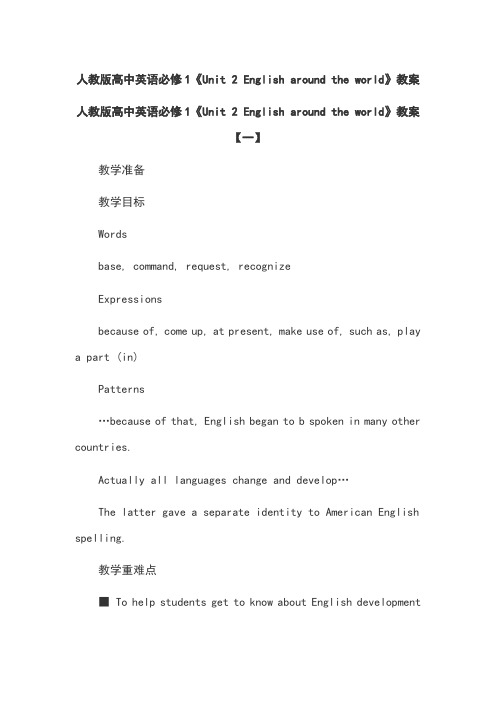
人教版高中英语必修1《Unit 2 English around the world》教案人教版高中英语必修1《Unit 2 English around the world》教案【一】教学准备教学目标Wordsbase, command, request, recognizeExpressionsbecause of, come up, at present, make use of, such as, play a part (in)Patterns…because of that, English began to b spoken in many other countries.Actually all languages change and develop…The latter gave a separate identity to American English spelling.教学重难点■ To help students get to know about English development■ To help students better understand “learning English”■ To help students understand and use some important words and expressions■ To help students identify examples of Indirect Speech (II): request & commands in the text教学工具课件教学过程⑴Warming up by listingGood morning, class. We have been learning English for several years. But how many English-speaking countries are there in the world? Now let’s make a list of them on the blackboard.English Countries ExplanationMother tongue the United Kingdomthe United States of AmericaCanadaAustraliaSouth AfricaIrelandNew Zealand The people in these countries are native speakers of English. In total, for more than 375 million people English is their mother tongue.Second language IndiaPakistanNigeriathe Philippines These people speak the language of their own country at home but the language of the government, schools, newspapers, and TV is English.Foreign language ChinaGermanyFranceetc. The number of people who learn English as a foreign language is more than 750 million.⑵Warming up by answering questions about EnglishGood morning, class. Today we shall start learning Unit 2 English around the world. But how much do you know about English?●What is Standard English?Standard English is the form of English that most people in Britain use, and that is not limited to one area or group of people.●What is a dialect?A dialect is a variety of a language spoken only in one area, in which words, or grammar are slightly different from other forms of the same language.●Do we have standard Chinese? What is it?In China there’re so many dialects that the government encourages the whole nation to speak Putonghua, which is regarded as standard Chinese.⑶Warming up by giving reasonsUnit 2 English around the world is what we are going to learn today. We are all learning English now because English is so popular in the world. But do you know why it is so? How many reasons could you giving for the spread of English around the world?* English is one of the official languages of the Olympic Games and the United Nations.* English dominates international websites and provides nearly all of the new computer terminology.* Tourism and trade from Western Europe and North America has contributed to the spread of English.* Satellite TV, radio programs like Joy FM, CDs and, of course, Hollywood films all broadcast English into China. Also,a number of Chinese films include English subtitles.2.Pre-readingWe are learning English here. But why are we learning it? Could you suggest to the class as many reasons as you can think of, why people in the world learn English?for work, as a hobby, to learn about other people, to travel, to read literature in the original, to read research papers, to meet foreigners, to surf the Internet, to pass exams, etc.Go on with your reasons. I shall write your suggestions on the board as you make them.3. Skimming the text for general ideasNow we go to page 9 to skim the text for the main idea of each paragraph.Paragraph 1: The spread of the English language in the worldParagraph 2: Native speaker can understand each other even if they don’t speak the same kind of English.Paragraph 3: English changes and develops when cultures meet and communicate with each other.Paragraph 4: By the 19th century English is settled.Paragraph 5: English is spoken as a foreign language or second language in South Asia.4. Reading and fillingRead the text to complete the chart below.Time English is influenced by…AD 450-1150 German1150-1500 FrenchIn the 1600’s Shakespeare, who make use of a wider vocabulary than ever beforeBy the 19th century Samuel Johnson, Noah WebsterNow Languages in South Asia, in Singapore, in Malaysia, in Africa and in China5. Reading and copyingNext we shall go over the text once more. This time try find and copy all the useful expressions down in your notebook.Useful expressionsat the end of…, make voyages, speak English as…, in the next century, change over time, communicate with…, be based on…, at present, become less like…, rule England, enrich the English language, make use of…, move to…, later in the 18th century, give a separate identity to…, have a very large number of…, fluent English speakers, become the language for…, develop one’s own identity, increase rapidly人教版高中英语必修1《Unit 2 English around the world》教案【二】教学准备教学目标Teaching aims:1) Get the students to master some important words, phrases and sentence patterns.2) Enable the students to use the language points by themselves.教学重难点Teaching important points:Master the usages of “more than , come up, over, be based on, present, a/ the number of”Teaching difficult points:present: v adj教学工具课件教学过程1 Do you know that there is more than one kind of English?more than one 不止一个eg:More than one girl in this school holds such a view.more than one 后跟___________,作主语时,谓语动词要用______。
高中英语人教版必修一Unit2Englisharoundtheworld课文知识点详解课件
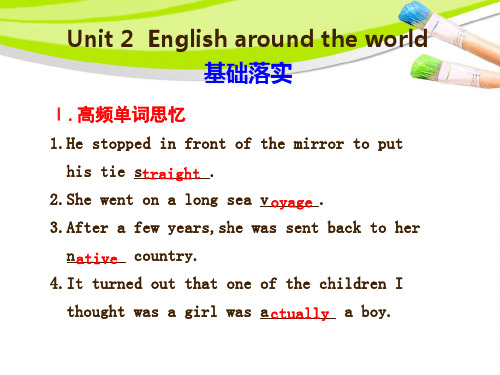
Ⅰ.高频单词思忆
1.He stopped in front of the mirror to put his tie straight .
2.She went on a long sea v oyage . 3.After a few years,she was sent back to her
(1)作主语的疑问代词+do you think/believe/ suppose/imagine/guess/say/consider/suggest+ 谓语+其他。
(2)不作主语的疑问词+do you think/believe/ suppose/imagine/guess/say/consider/suggest+ 主语+谓语+其他。
Everyone recognized him to be a lawful heir of the money. 大家都承认他是那笔钱的合法继承人。 归纳总结 recognize v.辨认出;承认。 (1)recognize sb./sth.by/from...根据……认出 某人/某事(物) be recognized to be/as...被认作……/被认为 是…… It is recognized that...人们公认…… (2)recognition n.认识;认出 out of/beyond recognition认不出来
Ⅲ.典型句式运用
1.Native English speakers can understand each other even if they don’t speak the same kind of English.以英语为母语的人,即使所讲 的英语种类不尽相同,他们也可以互相理解。 考点提炼 本句中的even if相当于 even though , 意为“ 即使,尽管”,引导让步状语从句。even if/though所引导的让步状语从句可用现在时代替 将来时。
人教新课标 必修一 Unit 2 English around the world Engli

Unit 2 English around the world 单元重点小结一词汇1.official adj . 官方的;正式的;office n 办公室officer 官员2.native adj/n. 本国的,本土的;本土人,本国人nationality 国籍;民族national adj 国家的;民族的3.actually adv 实际上;事实上(in fact, as a matter of fact)actual adj 实际的4.base vt 以某某为根据n 底部;基地;基础basic adj 基础的be based oneg This book is based on the magic dream.5.gradual adj 逐渐的;逐步的gradually adv 逐渐地6.enrich vt 使富裕;充实;完善rich adj 富有的; the rich 有钱人Eg.Taking part in the charitable activities enriches my life.7.identity n 本身;本体‘身份identify vt 识别;确定;鉴别8.fluent adj 流利的‘流畅的fluently 流利地fluency 流利,流畅9.frequent adj. 频繁的;常见的frequently adv 频繁地frequency 频率;频度age n 使用;用法useful adj 有用的use v/n 使用、利用mand n/vt 命令;指令;掌握have a good command of sth 对某某很了解command sb to do sth 命令某人做某事12.request n/vtrequest sb to do sth 要求某人做某事13.expression n 词语;表达express vt 表达(Express 快递快车)expressiveadj14.recognize vt 辨认出;承认;公认recognizable 容易认出的;易于识别的recognition n 认出,识别15.straight adv/adj 形容词和副词同形二短语1.because of 因为;由于(后面不接句子)e up 走进,上来,提出(come up with an idea,想出一个主意。
新人教版必修一Unit2 English Around the World精品示范教案 (全单元)
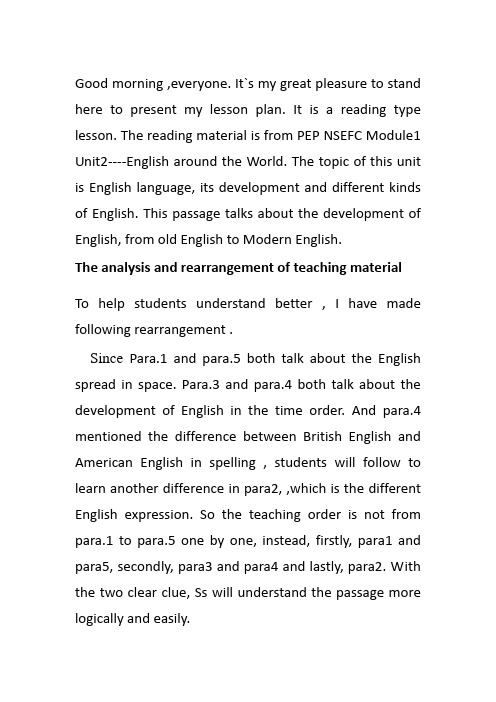
Good morning ,everyone. It`s my great pleasure to stand here to present my lesson plan. It is a reading type lesson. The reading material is from PEP NSEFC Module1 Unit2----English around the World. The topic of this unit is English language, its development and different kinds of English. This passage talks about the development of English, from old English to Modern English.The analysis and rearrangement of teaching materialTo help students understand better , I have made following rearrangement .Since Para.1 and para.5 both talk about the English spread in space. Para.3 and para.4 both talk about the development of English in the time order. And para.4 mentioned the difference between British English and American English in spelling , students will follow to learn another difference in para2, ,which is the different English expression. So the teaching order is not from para.1 to para.5 one by one, instead, firstly, para1 and para5, secondly, para3 and para4 and lastly, para2. With the two clear clue, Ss will understand the passage more logically and easily.The analysis of learning conditionAs the center of my class, my students have already acquired a certain amount of words and expressions , and equipped with basic reading skills, which make it possible to generally understand the passage. While they have learned English for several years, they are still in lack of the background knowledge of the English, such as the history of English , how it changes and why. What`s more, they need more chance to practice the reading skills, so that they can use correctly and freely. Concerning of the teaching material and my students` learning condition , I set following achievable and practical Learning ObjectivesBy the end of the lesson, Ss will be able to achieve the Language skills1)As a famous linguistic said “reading is a psycholinguistic guessing game”, prediction ability plays an important role on reading effectively and efficiently. So in this lesson, students will continually practice such ability to guess “ road” mean , and based on the understanding of the title to predict the reading content.2)Another main reading skill to develop is to get the main information--- finding the key words in a sentence to summarize the English feature in different time3)Since reading as a input process, students need to transfer the information into their own , so retelling is a good way to check their learning. Students will ask to retell the passage with the help of the offered clues and key words, so their speaking ability will have another practice.2. Language knowledge1)Know the meaning and usage of new words, phrasesand sentences properly, such as: rule (used as a verb), make voyage to conquer ect. Whats` more , they can use it correctly and freely2)Ss will have deeper understand the topic of Englishand Know the difference between American English and British English in spelling and expression. And the terms of “first language “,”second language , “ foreign language “.3. AffectsStudents will have deeper impression of the popularity of English speaking by being offered the specific figures , so they will realize the importance of learning English and have higher motivation to learn. Additionally, they can consider a language age as an developing process instead of a static one.4. Learning strategies1) communicate strategy:According to the new curriculum criteria, the teaching process should be an interactive process: by interacting with teacher and classmates, students can achieve accomplishments easily and happily . so students will encouraged to communicate with others in English politely and fluently not only in class but also after class.2) resource strategySs can develop their resource strategy by searching the internet to learn more about the English language.5. Cultural awareness1) Since language as the media of culture, students will realize that learning a language and learning its history should be hand in hand. So while learning thedevelopment of English, students will consider more about the history. Only by doing so, they will have a wild cultural mind.2) Since many important person played important roles in English development, students will learn from such famous person by getting more information. Language focuses1.Predicting, scanning and retelling2.The new words and expressions and the languagepoints which are associated with them3.The development of EnglishAnticipated difficulties1.Employ different reading skills to understand the textaccurately.2.Grasp the knowledge about the development ofEnglish and retell it.Teaching methodsAccording to Stanovich `s opinion :reading is an interactive process, involving knowledge of the world and various types of language knowledge , any of which may interact with any other to contribute to text comprehension. So I mainly adopt interactive-compensatory approach.Teaching aidsMultimedia devices and PPT documentsTeaching procedure:Now I will present my teaching procedure. I mainly adopt the three –stage models: pre-reading; wile-reading; post-readinglead in (5mins)At the beginning of the class, I will lead in the reading material by the following two activities:First I will offer two pictures. One is a piece of written paper, which looks like musical composition, and another picture is a ring, on which carves the unfamiliar words . I will ask them to guess what are they , and lead to the answer that they are old English. By creating the information gap, students will have a high motivation to learn more about old English .The second activity is that I will encourage students to try to translate four sentences take from Robert burns: red, red rose.During the process, students will not only realize the difference between old English and modern English butalso enjoy the pleasure of translation.These two lead-in activities will naturally arouse their motivation to know what has actually happened to English. So, it would be easy for my students to learn that the word”road “in the tile ,which mean the “development”While-readingStep1 fast reading (6mins)Ativity1:After understanding the title, students will ask to predict how would the author illustrate the development of modern English ,if he or she was the writer what aspects of English would be mentioned. Activity2:Then skimming the passage to check their prediction and get that the whole passage can be divide two parts: one is the way of English spread, which is in the space aspect, and the other is about the way of English change, which is in the time order. With this two clues ,students will have a clear understand of the passage.Step2 careful reading p1/5 (10mins)Activity1Before learning the English spread, I will ask students toguess how many people are speaking English ,how many countries take English as their official language. By making the contrast the English use in 16c ,students will realize the popularity of English and the importance of learning English .Activity 2Then students will go though paragraph1 and 5 to list the English spoken countries, and learn the difference of the terms: first language, second language , foreign language .Activity 3Students read paragraph1 and 5 again and find when and why English began to spoken in other countries. So the students will learn about the history of British exploration age and learn the important term “make voyage to conquer”, and the new word “ colony”Activity 4 guess “where am I from”While the spreading, English has borrowed many words from other countries, so students will try to match the words with the country they come from. This interesting activity will help students to realize that if we want to keep a language alive, we must keep a wide mind tokeep up with the tome and bring into others` word Step 3 careful reading p2-4 (15mins)Activity 1.Read p3-4 to find the key time, and fill in the blanks of the table,which is about the English feature in certain time. As the passage mentions many important person who made great contribution to the English change , I will add more personal information to help students better understandActivity 2.Since the p4 mentioned the American English identity , students after learning the different spelling of some words, they will ask to read p2 to learn different expression .Post-reading1.Retell the passage (8mins)You are supposed to be English linguistic teachers, and this is the first class of the new term , you have to give a brief introduction of the development of modern English to your students .Homework (1mins)1.Search the internet or read books to learn moreabout the English language and the British history 2.Discuss why people all over the world are speaking English, will such phenomena kill the language diversity ?At last, it’s my blackboard design. On the right, they are the key language points. In the middle, it’s the outline of the passage.That’s all for my presentation, thanks for your attention!。
- 1、下载文档前请自行甄别文档内容的完整性,平台不提供额外的编辑、内容补充、找答案等附加服务。
- 2、"仅部分预览"的文档,不可在线预览部分如存在完整性等问题,可反馈申请退款(可完整预览的文档不适用该条件!)。
- 3、如文档侵犯您的权益,请联系客服反馈,我们会尽快为您处理(人工客服工作时间:9:00-18:30)。
Period 4Grammar(Direct Speech and Indirect Speech(Ⅱ))整体设计从容说课This is the fourth teaching period of this unit. To test whether the students have grasped theimportant and difficult language points they learned in the last period, the teacher should first offer them some revision exercises.This teaching period is a grammar lesson. The students are expected to make clear what acommand is and what a request is, and how to turn their direct speech into indirect speech in this period.In this lesson, we will first offer a supposed situation and make the students learn about the differences between demands and requests. The situation makes students know that in English, giving commands is less polite than making a request. Not everyone should give commands.People who often give commands are bosses, teachers and parents. If giving commands, we use such structures as “Do. . . ” and “Don’t. . . ”; if making a request, we can say “Please do. . . ”, “Will/Would you(please). . . ? ”, “Can/Could you(please). . . ?”, etc.Later on, we’ll summarize the rules of turning Direct speech into Indirect speech and make students know:if we change commands, we may use the pattern:sb. told/ordered sb. else(not)to dosth. ; if we change requests, we can use “sb. asked sb. else(not)to do sth. ”. Then ask them to do exercises and make dialogues according to supposed situations. This can help the students connect grammar rules with proper language forms so as to make grammar rules less abstract.教学重点 Get the students to master th e rules of how to express a request and a commandin direct speech and indirect speech.教学难点 Enable the students to use a request and a command in direct speech and indirect speech.教学方法 1. Task-based teaching and learning2. Cooperative learning3. Discussion and practice教具准备 A projector and other normal teaching tools三维目标Knowledge aim:Get the students to learn the rules of requests and commands in direct speech and indirect speech.Ability aim:Enable the students to use the rules properly in different situations.Emotional aim:Enable the students to communicate with others well by using requests and commands properly.教学过程设计方案(一)→Step 1 Revision1. Check the homework exercises.2. Get the students to dictate some useful words and expressions.3. Change a statement or a question into indirect speech.→Step 2 Summarizing the difference between commands and requestsThe teacher speaks to three students:Xiao Ming, close the door.Xiao Mei, please pass on the dictionary to Li Ming.Wang Juan, will you please answer me a question?Write the three sentences on the blackboard. Ask what the difference is among them. Then tell the students:Speaking the first sentence, I give a command. Using “Please. . . ” or “Will you please. . . ? ”, I make requests.Show the following on the screen.Direct SpeechCommands Do. . . /Don’t. . .Requests Do. . . , please.Can/Could you(please). . . ?Will/Would you(please). . . ?→Step 3 Practice(1)Turn to Page 12.1. Change the commands into requests(Exercise 3 in Discovering useful structures). Students work in pairs.2. Make dialogues using the commands/requests. Work in pairs. Students are encouraged to imagine interesting dialogues.Sample dialogues:Situation 1A: Excuse me. Who would do me a favor to close the door?B: Speak louder, please.A: Will you please close the door?B: OK. I will.A: Thank you very much.B: My pleasure.Situation 2A: Excuse me. It’s time for me to get off. Would you please make way for me?B: Of course. I’ll be happy to make way for you. Go ahead.A: Thank you.B: Y ou’re welcome. Oh, my God, I need to loose my weight.3. Do Exercise 2(Using structures Page 50)Students read the exercise to know what they are expected to do, then do it individually. While checking the answers, deal with any problems students may meet.→Step 4 Summarizing the rules of turning Direct speech into Indirect speechWork in pairs.Show some examples on the screen. Ask students to study them carefully and discuss in pairs to find out the rules.“Make sure the light is off, ” The teacher said to me.The teacher told me to make sure the light was off.“Don’t play balls in the street, ” the policeman said to us. The policeman tol d us not to play balls in the street.“Can you lend me ten dollars? ” Mary said.Mary asked me to lend her ten dollars.“Will you please not smoke here? ” she said.She asked me not to smoke here.A few minutes later, ask one student to write his or her answers in the table.Direct Speech Indirect speechCommands Do/Don’t. . .Requests Do. . . , please.Can/Could you(please). . . ?Will/Would you(please). . . ?After discussion, the correct answer is shown on the blackboard. The students can see:Direct Speech Indirect speechCommands Do/Don’t. . .Sb. told sb. else(not)to do. . .Sb. asked sb. else(not)to do. . . Requests Do. . . , please.Can/Could you(please). . . ?Will/Would you(please). . . ?Conclusion:If we change commands, we may use the patterns:sb. told/ordered sb. else(not)to do sth. ; if we change requests, we can use “sb. asked sb. else(not)to do sth. ”→Step 5 Practice(2)1. Turn to Page 50. Do Exercise 1 in Using structures.Teacher makes a dialogue with two students. Just like the following:T:Turn on the light, Mary.A:What did our teacher tell Mary?B:She told Mary to turn on the light.Students work in groups of 3.2. Ask students to work in groups of 3 to make a dialogue. Be sure to use indirect and direct speech and requests.Supposed situation:A doesn’t know the way to the cinema and turns to C for help. B retells C’s words to A.→Step 6 Consolidation1. They weren’t talking to you, but you heard them. What did you hear them say?1)She told him to shut up. I am sure I heard her say to him “______________”.2)He asked her to speak louder. I am sure I heard him ask her “______________”.3)She told her to try the lift. I am sure I heard her say to her “______________”.4)He told them not to wait for him. I am sure that I heard him say to him “______________”.5)She told him to stop wasting time. I am sure I heard her say to him “______________”.6)The girl asked her father to tell her a story. I am sure I heard her ask him “______________”.2. Work in pairs. Look at the Dos and Don’ts below. Turn them into commands and requests. First use Direct Speech, then use Indirect Speech.Dos Don’tsBuy some bread for her. Make too much noise.Help her tidy the room. Forget to put your umbrella in the stand.Speak quietly on the phone. Smoke in the bathroom.Turn down the radio. Stay up too late.3. GamesChoose two students act as two robots. One listens to the requests, the other listens to the commands. Other students give either requests or commands, and the robots do what the students ask them to do.If time is limited, it can be done as homework.→Step 7 Homework1. Finish off the workbook exercises.2. Prepare the next part.板书设计Unit 2English around the worldGrammar:the Imperative Sentence and Its Indirect SpeechDirect Speech Indirect speechCommands Do/Don’t. . .Sb. told sb. else(not)to do. . .Sb. asked sb. else(not)to do. . . Requests Do. . . , please.Can/Could you(please). . . ?Will/Would you(please). . . ?活动与探究If you are an assistant, make some Dos and Don’ts for your school library. Then make dialogues with your classmates using commands and requests and the indirect speech.。
